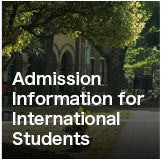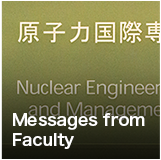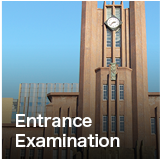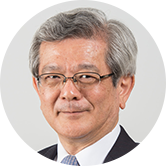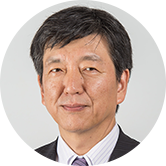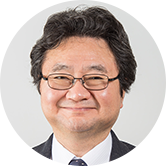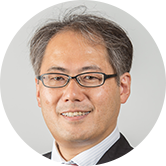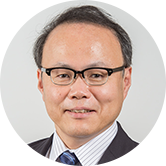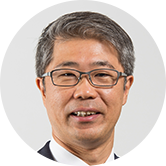- HOME
- For Prospective Students
- Study at the Department of Nuclear Engineering and Management
- Professor Shuichi HASEGAWA
huichi HASEGAWA Professor
Study06
The goal is to produce not only nuclear reactors but also other valuable things by applying our research and making it possible to obtain new information.
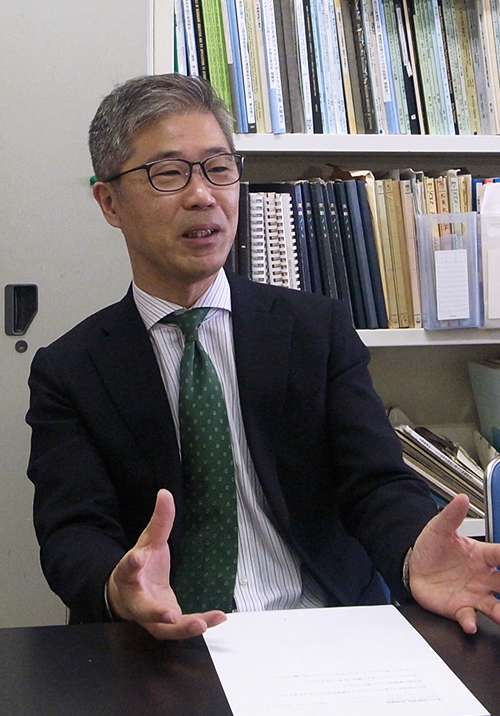
Which areas of nuclear power can students learn about in your laboratory?
At my laboratory, we study a field within nuclear power called the nuclear fuel cycle. The process of assembling uranium fuel and putting it in a nuclear reactor, then later reprocessing the spent fuel and turning it into a fuel again, is called the nuclear fuel cycle, and that is what we research in my laboratory. While nuclear frisson of uranium reaches only about 0.7% in nature, it must be condensed to more than 3% when using it in a reactor. Moreover, there are two types of uranium fuel. One is capable of frisson and the other is not, but they are actually the same element. One must distinguish between their differences to separate these subtle variations and condense the right one. We conduct an experiment using a laser for this separation. There are electrons circling around a nucleus, and their orbits change according to the size of the nucleus. Thus, one can control them using a corresponding laser. Several tons of uranium is required when it is used for uranium fuel or for a nuclear reactor. I find it very interesting, in terms of engineering that such a large amount of uranium can be distinguished by a slight difference in the way electrons circulate. One of our future research themes is to see if it is possible to apply this interaction between lasers and matter to fields other than nuclear reactors. For instance, there is the problem of released radioactive material from the Fukushima nuclear power station accident. Lasers could be used to measure these materials. Using lasers to estimate what is inside the melted and accumulated fuel inside the Fukushima power station, remote analysis would be possible. Moreover, if it becomes possible to control individual atoms, applications such as obtaining quantum-mechanical quantum information or quantum communication may be realized. I would like our research to contribute to these cutting-edge innovations.
What types of future paths (careers) are there for your students after their studies?
While we conduct experiments with lasers in my laboratory, we are no longer in a time where students can just continue working with lasers for the rest of their lives even if they earn a doctorate. Of course, you would be happy if you could find a job that is directly related to what you studied in graduate school. Students must be able to explain the experiment they have proposed, and whether they can confidently say that they completed that experiment. I think that it is important to learn to think about the necessary steps to realize something within a scientific framework. While I have some graduates who intend to dedicate their lives to research, I also have former students working in manufacturing, laboratories, and fields such as a bank’s think tank as well as former students who started an IT business. I would like my former students to utilize the way of thinking that they develop here and contribute to society while working in these diverse fields. Experiments often do not result in the way they were intended. The mental power of the students is improved as they are in a practice where it is necessary to think about how to shape results within the limitations.
Could you tell us what you think are the attractive aspects of the Department of Nuclear Engineering and Management?
While we conduct experiments with lasers in my laboratory, we are no longer in a time where students can just continue working with lasers for the rest of their lives even if they earn a doctorate. Of course, you would be happy if you could find a job that is directly related to what you studied in graduate school. Students must be able to explain the experiment they have proposed, and whether they can confidently say that they completed that experiment. I think that it is important to learn to think about the necessary steps to realize something within a scientific framework. While I have some graduates who intend to dedicate their lives to research, I also have former students working in manufacturing, laboratories, and fields such as a bank’s think tank as well as former students who started an IT business. I would like my former students to utilize the way of thinking they obtained here and contribute to society while working in these diverse fields. Experiments often do not result in the way they were intended. The mental power of the students is improved as they are in a practice where it is necessary to think about how to shape results within the limitations.
Could you give us a message for prospective students?
Maybe some parents are concerned about their children’s future career when they are studying nuclear power. However, as exemplified by the various applications of the atomic nucleus, studying in this department does not automatically mean a career in nuclear power. I think there are many fields where the ways of thinking one can only learn here will be useful.



